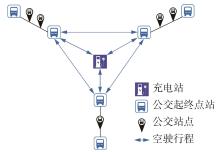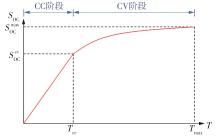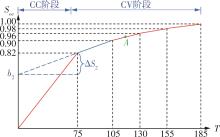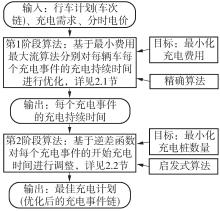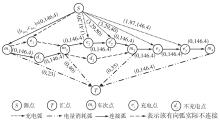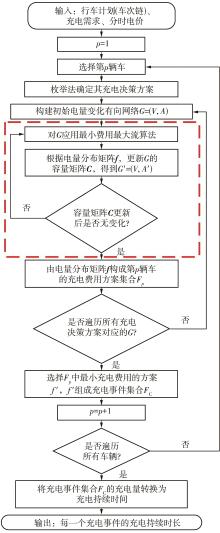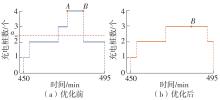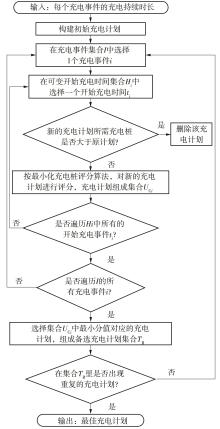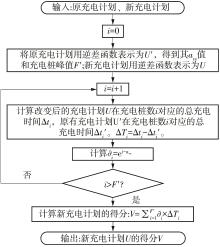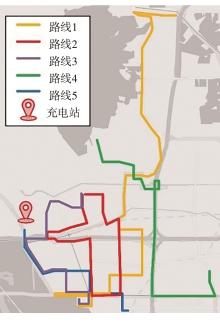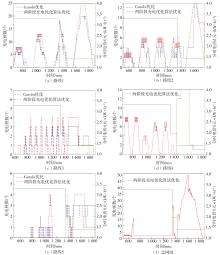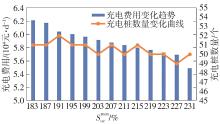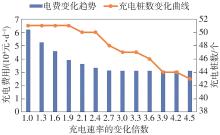Journal of South China University of Technology(Natural Science Edition) ›› 2024, Vol. 52 ›› Issue (9): 115-130.doi: 10.12141/j.issn.1000-565X.230524
Special Issue: 2024年交通运输工程
• Traffic & Transportation Engineering • Previous Articles Next Articles
Charging Schedule Optimization of Battery Electric Bus Considering Nonlinear Charging Profile
XIONG Jie1(), LAI Kefan2, LI Tongfei1(), DOU Xueping1, XU Yan1
- 1.Beijing Key Laboratory of Traffic Engineering, Beijing University of Technology, Beijing 100124, China
2.No. 92942 Unit of People's Liberation Army of China, Beijing 100161, China
-
Received:2023-08-14Online:2024-09-25Published:2024-01-05 -
Contact:李同飞(1990—),男,博士,副教授,主要从事合乘出行和复杂交通系统建模与分析等研究。 E-mail:tfli@bjut.edu.cn -
About author:熊杰(1988—),男,博士,副教授,主要从事公交系统优化和城市轨道交通运营组织等研究。E-mail: jxiong@bjut.edu.cn -
Supported by:the National Natural Science Foundation of China(71901007);the Beijing Municipal Natural Science Foundation(8212004)
CLC Number:
Cite this article
XIONG Jie, LAI Kefan, LI Tongfei, et al. Charging Schedule Optimization of Battery Electric Bus Considering Nonlinear Charging Profile[J]. Journal of South China University of Technology(Natural Science Edition), 2024, 52(9): 115-130.
share this article
Table 3
Comparison results of Gurobi and two-stage charging optimization algorithm"
| 路线 | 车辆数 | 车次数 | 总成本/ (元·d-1) | 模型M2的 变量数/个 | 总成本/ (元·d-1) | 用时/s | 总成本/ (元·d-1) | 用时/s | 误差率/% |
|---|---|---|---|---|---|---|---|---|---|
| 初始充电计划 | Gurobi | 两阶段充电优化算法 | |||||||
| 1 | 25 | 100 | 43 956.25 | 12 786 | 31 113.95 | 1 485.27 | 31 500.14 | 1.29 | 1.24 |
| 2 | 13 | 65 | 41 906.77 | 5 091 | 18 393.53 | 57.71 | 18 393.53 | 0.59 | 0.00 |
| 3 | 5 | 55 | 10 946.16 | 3 890 | 5 264.63 | 1 267.58 | 5 474.27 | 6.06 | 3.98 |
| 4 | 15 | 107 | 40 013.56 | 11 780 | — | 超时 | 18 623.82 | 10.67 | — |
| 5 | 7 | 56 | 8 065.26 | 3 954 | 4 234.79 | 157.49 | 4 234.79 | 2.53 | 0.00 |
| 总网络 | 65 | 383 | 142 158.00 | 118 099 | — | 超时 | 76 042.54 | 55.12 | — |
| 1 | ZHOU Y, MENG Q, ONG G P .Electric bus charging scheduling for a single public transport route considering nonlinear charging profile and battery degradation effect[J].Transportation Research Part B:Methodological,2022,159:49-75. |
| 2 | 王玉生,张庆泽 .“双碳”目标下电动公交充电站优化布局研究[J].科学决策,2021(10):112-124. |
| WANG Yu-sheng, ZHANG Qing-ze .Research on the optimal layout of electric bus charging stations under the “dual carbon”goal[J].Scientific Decision Making,2021(10):112-124. | |
| 3 | 姜岚清,张勇 .电动公交车线路和充电设施及策略规划方法研究[J].山东科学,2019,32(6):49-61. |
| JIANG Lan-qing, ZHANG Yong .Research on route and charging facilities and strategic planning methods for electric buses[J].Shandong Science,2019,32(6):49-61. | |
| 4 | CHEN Z B, YIN Y F, SONG Z Q .A cost-competitiveness analysis of charging infrastructure for electric bus operations[J].Transportation Research Part C:Emerging Technologies,2018,93:351-366. |
| 5 | KUNITH A, MENDELEVITCH R, GOEHLICH D .Electrification of a city bus network-an optimization model for cost-effective placing of charging infrastructure and battery sizing of fast-charging electric bus systems[J].International Journal of Sustainable Transportation,2017,11(10):707-720. |
| 6 | XYLIA M, LEDUC S, PATRIZIO P,et al .Locating charging infrastructure for electric buses in Stockholm[J].Transportation Research Part C:Emerging Technologies,2017,78:183-200. |
| 7 | 孙宇乐 .电动公交车充电站规划和充电策略研究[J].电工技术,2022(20):128-132. |
| SUN Yu-le .Research on the planning and charging strategy of electric bus charging stations[J].Electric Engineering,2022(20):128-132. | |
| 8 | 肖白,朱珈汛,姜卓,等 .考虑车辆充电调度机制的电动公交车充电站规划[J].电力自动化设备,2022,42(1):148-155. |
| XIAO Bai, ZHU Jia-xun, JIANG Zhuo,et al .Planning of electric bus charging stations considering vehicle charging scheduling mechanism[J].Electric Power Automation Equipment,2022,42(1):148-155. | |
| 9 | BAO Z Y, LI J P, BAI X H,et al .An optimal charging scheduling model and algorithm for electric buses[J].Applied Energy,2023,332:120512. |
| 10 | LIU K, GAO H, LIANG Z,et al .Optimal charging strategy for large-scale electric buses considering resource constraints[J].Transportation Research Part D:Transport and Environment,2021,99:103009. |
| 11 | LEOU R C, HUNG J J .Optimal charging schedule planning and economic analysis for electric bus charging stations[J].Energies,2017,10(4):483. |
| 12 | ZENG Zi-ling, WANG Shuai-an, QU Xiao-bo .On the role of battery degradation in en-route charge scheduling for an electric bus system[J].Transportation Research Part E:Logistics and Transportation Review,2022,161:102727. |
| 13 | 蔡子龙,束洪春 .分时电价模式下电动公交快速有序充电策略[J].电工技术学报,2020,35(s2):544-555. |
| CAI Zi-long, SHU Hong-chun .Rapid and orderly charging strategy for electric buses under the time of use electricity pricing model[J].Transactions of China Electrotechnical Society,2020,35(s2):544-555. | |
| 14 | 李斌,刘畅,陈慧妙,等 .基于混合整数规划的电动公交车快速充电站有序充电策略[J].电网技术,2016,40(9):2623-2629. |
| LI Bin, LIU Chang, CHEN Hui-miao,et al .Ordered charging strategy for electric bus rapid charging stations based on mixed integer programming[J].Power System Technology,2016,40(9):2623-2629. | |
| 15 | 武小梅,冯琪劲,严干贵,等 .基于双层优化的电动公交车有序充电策略[J].电网与清洁能源,2021,37(1):119-126. |
| WU Xiao-mei, FENG Qi-jin, YAN Gan-gui,et al .Ordered charging strategy for electric buses based on double layer optimization[J].Advances of Power System & Hydroelectric Engineering,2021,37(1):119-126. | |
| 16 | 周丹,任志伟,孙可,等 .复杂运营环境下快充型公交充电策略优化方法[J].储能科学与技术,2020,9(1):195-203. |
| ZHOU Dan, REN Zhi-wei, SUN Ke,et al .Optimization method for fast charging bus charging strategy in complex operating environment[J].Energy Storage Science and Technology,2020,9(1):195-203. | |
| 17 | ZHANG Le, WANG Shuaian, QU Xiaobo .Optimal electric bus fleet scheduling considering battery degradation and non-linear charging profile[J].Transportation Research Part E:Logistics and Transportation Review,2021,154:102445. |
| 18 | MONTOYA A, GUÉRET C, MENDOZA J E,et al .The electric vehicle routing problem with nonlinear charging function[J].Transportation Research Part B:Methodological,2017,103:87-110. |
| 19 | WANG Yusheng, HUANG Yongxi, XU Jiuping,et al .Optimal recharging scheduling for urban electric buses:a case study in Davis[J].Transportation Research Part E:Logistics and Transportation Review,2017,100:115-132. |
| [1] | TANG Jinjun, REN Maoxin, LI Zhitao, et al. Optimization of Metro Feeder Bus Routes Based on Surrogate-Assisted NSGA-Ⅱ Algorithm [J]. Journal of South China University of Technology(Natural Science Edition), 2024, 52(11): 95-105. |
| [2] | WENG Jiancheng, WU Mingzhu, WEI Ruicong, et al. Speed Prediction for Road Around Large Scale Activities Venues Considering Multiple Factors Synergism [J]. Journal of South China University of Technology(Natural Science Edition), 2024, 52(8): 34-44. |
| [3] | SUN Jian, WU Jiyan, LI Zheng, et al. Optimization Model of Incentive-Based Ridesharing Scheme Under the Constraint of Market Penetration [J]. Journal of South China University of Technology(Natural Science Edition), 2024, 52(6): 12-23. |
| [4] | WU Jiaorong, CHEN Caiting, DENG Yongqi. Coupling Analysis of Rail Transit Stations’ Network Centrality, Ridership and Spatial Heat Map [J]. Journal of South China University of Technology(Natural Science Edition), 2024, 52(5): 31-42. |
| [5] | WEI Liying, SHI Jingjing. On the Nonlinear Relationship Between Land Use and Urban Rail Transit Passenger Flow [J]. Journal of South China University of Technology(Natural Science Edition), 2024, 52(5): 43-51. |
| [6] | DONG Chunjiao, LU Yuxiao, MA Sheqiang, et al.. Analyzing and Modeling of Multi-Class E-Bikes Violation Behaviors at Signalized Intersection [J]. Journal of South China University of Technology(Natural Science Edition), 2024, 52(1): 83-89. |
| [7] | ZHANG Wenhui, SU Jiaqi, HA Zihong, et al. Location and Capacity Optimization Model of Battery-Swapped Electric Bus Charging Station [J]. Journal of South China University of Technology(Natural Science Edition), 2023, 51(10): 126-134. |
| [8] | HU Xinghua, CHEN Xinghui, WANG Ran, et al. Optimization Model of Bus Priority Control Considering Carbon Emissions with Stochastic Characteristics [J]. Journal of South China University of Technology(Natural Science Edition), 2023, 51(10): 160-170. |
| [9] | BIE Yiming, ZHU Aoze, CONG Yuan. Electric Bus Scheduling Method Considering Differences in the State of Health of Batteries [J]. Journal of South China University of Technology(Natural Science Edition), 2023, 51(10): 11-21. |
| [10] | ZHAO Xiaomei, ZHU Xiangyuan, WANG Qin, et al. Operational Reliability Optimization Strategies of Multi-type Bus Lines [J]. Journal of South China University of Technology(Natural Science Edition), 2023, 51(8): 32-39. |
| [11] | ZHAO Jiandong, JIAO Lanxin, ZHAO Zhimin, et al. A Car-Following Model Driven by Combination of Theory and Data Considering Effects of Lane Change of Side Cars [J]. Journal of South China University of Technology(Natural Science Edition), 2023, 51(6): 10-19. |
| [12] | MA Shuhong, YANG Lei, CHEN Xifang. Resilience Evolution of Multi-mode Transportation Network in Urban Agglomeration Based on Risk Diffusion [J]. Journal of South China University of Technology(Natural Science Edition), 2023, 51(6): 42-51. |
| [13] | LU Qingchang, XU Biao, CUI Xin . Research on the Non-linear Relationship Between Built Environment and Bike-sharing Flow Rate [J]. Journal of South China University of Technology(Natural Science Edition), 2023, 51(2): 100-110. |
| [14] | CHENG Xiaoyun, QU Xiaping, ZHANG Xueyu, et al. Analysis of Propagation Mechanism of Recurrent Congestion Based on Dynamic Bayesian Network [J]. Journal of South China University of Technology(Natural Science Edition), 2022, 50(11): 25-34. |
| [15] | CHEN Tingzhao, CHEN Yanyan, WANG Zili, et al. Methods of Determining the Range of Non-motorized Travel Influence Area Under the Concept of “Metro Transit Micro-center” [J]. Journal of South China University of Technology(Natural Science Edition), 2022, 50(7): 56-65. |
| Viewed | ||||||
|
Full text |
|
|||||
|
Abstract |
|
|||||
